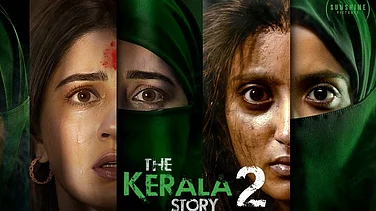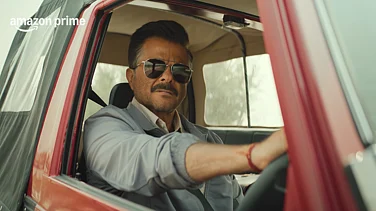Hindi movies are known for their heroes/heroines, but the villains, or rather, actors in villainous roles, are the heavy lifters. As against Dilip Kumar's around 70, Rajesh Khanna's over 170 and Amitabh Bachchan's 250-odd films, Prem Chopra appeared in 370-odd over 60 years, Pran - the template for the Hindi film villain - in over 380 films in 67 years, and Madan Puri went on to clock well over 400 in more than four decades.
With his pervasive presence in movies, of all types from the 1940s to the 1980s, a popular saying in the times was -- "if you wanted to make a movie then all you needed was an Arriflex camera, some raw film, and Madan Puri".
Whether the film was mythological or historic, a social or family drama, a romantic or crime thriller, featuring secret agents, hippies or NRIs, a gem of a parallel cinema, or the angry young man era, Madan Puri - who has the unique distinction of acting both with K.L. Saigal and Amitabh Bachchan - could be somewhere in it, and not necessarily in a negative role.
Born on this day (September 30) in 1915 in Punjab's Nawanshahr, Madan Puri, who is now chiefly known as the elder brother of Amrish 'Mogambo' Puri, was a versatile and multi-facetted actor, whose "everyman" face could turn saturnine, sinister, devious, haggard, or kindly, when needed.
That enabled him to portray corrupt businessmen, edgy doctors, knife-happy gangsters, stern fathers, amiable uncles, conscientious or corrupt police officers, heartless money-lenders, eccentric scientists, seedy night-club owners, sneering pimps, brutal jailors, duplicitous politicians, devious foreign agents, bloodthirsty dacoits and many more.
Madan Puri also had to his credit a double hat-trick of playing a Chinese villain, playing the role in at least six notable Hindi films - John Chang in Ashok Kumar-Madhubala crime noir "Howrah Bridge" (1958), Chang in international caper "Singapore" (1960) and Joseph Wong in the noirish "China Town" (1962), both starring Shammi Kapoor, Comrade Chang in spy thriller "Shatranj" (1969), yet another Chang in Dev Anand's "Prem Pujari" (1970), and then Wong again in "Saazish" (1975), an international crime caper starring Dharmendra and Sairu Banu.
He was also the "Captain", of an unnamed enemy power, in the spy flick "Aankhen" (1968), starring Dharmendra and Mala Sinha.
Coming from a family, broadminded (for those days) enough not to scorn the acting profession - since his cousin was the legendary K.L. Saigal, Madan Puri was fond of acting since his early days with his first starring performance being a 1936 play at Simla's Gaiety Theatre - Pran was the female lead!
Though he was not the first of his siblings to join and shine in films - eldest brother Chaman Puri was a character actor in several films - Madan Puri moved to Bombay in the early 1940s, when he was helped into films by Saigal.
After some uncredited bit roles from "Khazanchi" (1941), he, like many others, wanted and began as a hero, but these films never clicked and he found his niche as a villain - on the suggestion of Dev Anand.
Thus began an eventful career that spanned four decades, mostly as an egregious, and chronic villain, though he later switched to roles of a kindly elder, and only came to an end when he succumbed to a sudden heart attack in 1985.
His notable villainous roles, apart from the Chinese appearances, were as the jealous rich man Manilal in "Jhanak Jhanak Payal Baaje" (1955), blackmailing employee Rajan in Kishore Kumar-starrer science fiction comedy "Mr. X in Bombay" (1964), Dr. Acharya in the Agatha Christie-influenced remote isle murder thriller "Gumnaam" (1965), the volatile henchman Balbir in "Waqt" (1965), the lecherous Madan Chicagowala in "Shagird" (1967), and rival gang-leader Samant in "Deewaar" (1975), among others.
On the other hand, Madan Puri also made his mark as the faithful employee - for a change - in Shammi Kapoor's "Kashmir Ki Kali" (1964), public prosecutor Khanna in terse murder mystery/courtroom drama "Ittefaq" (1969), the nostalgic London-based expatriate Sharma in "Purab Aur Paschim" (1970) - who listens to Saigal records!, the second of three Mahesh Jetleys, who are "conspiring to murder their wives" in "Hulchul" (1971), Dilip Kumar's henchman Khushiram Khusal Singh in "Vidhaata" (1982), and many more.
His other prominent films include "Majboor" (1974), "Manoranjan" (1974), "Roti Kapda Aur Makaan" (1974), "The Godfather"-inspired "Dharmatma" (1975), "Mehbooba" (1976), "Kalicharan" (1976), "Shirdi Ke Sai Baba" (1977), "The Great Gambler" (1979), "Jaani Dushman" (1979), "Noorie" (1979), "Alibaba Aur 40 Chor" (1980), "The Burning Train" (1980), "Kranti" (1981), "Andha Kanoon" (1983), "Hero" (1983), and "Aaj Ka M.L.A. Ram Avtar" (1984).
As Madan Puri once said, he was "the aloo-pyaz that can be put in any Bollywood dish".
Hindi Cinema's Favourite Chinaman: Madan Puri And His Onscreen
Hindi movies are known for their heroes/heroines, but the villains, or rather, actors in villainous roles, are the heavy lifters. As against Dilip Kumar's around 70, Rajesh Khanna's over 170 and Amitabh Bachchan's 250-odd films, Prem Chopra appeared in 370-odd over 60 years, Pran - the template for the Hindi film villain - in over 380 films in 67 years, and Madan Puri went on to clock well over 400 in more than four decades.
Published At:

Madan Puri
Madan Puri
- Previous Story
 Kerala High Court Orders Screening Of The Kerala Story 2 Amid Row: 'Movie Has Wrong Portrayal'
Kerala High Court Orders Screening Of The Kerala Story 2 Amid Row: 'Movie Has Wrong Portrayal' - Next Story
WATCH
MORE FROM THE AUTHOR
PHOTOS
×

















